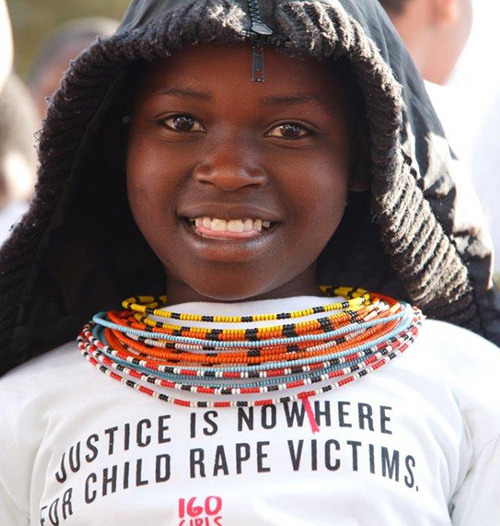Background
In 2013, a Kenyan High Court Decision made legal history for girls’ rights internationally and set the high water mark in protecting girls from rape. The decision was the long fought result of the “160 Girls” project, a legal effort mounted by the Canadian charity the equality effect (e²) in partnership with the Tumaini Girls’ Rescue Centre, at Ripples International, Meru, Kenya. The victory secured access to justice for the 160 Girls that inspired the adoption of the case, and legal protection from rape for all 10,000,000 girls in Kenya.Click here to read the Republic of Kenya’s High Court Ruling for “160 Girls” (pdf).
“160 Girls” Kenya National Implementation Project
The “160 Girls” project is a long term initiative, analogous to the behaviour change achieved through drunk driving campaigns, working with the law, police and local communities. The “160 Girls” National Implementation initiative addresses the root cause of the systemic and epidemic sexual violence experienced by girls – perpetrator accountability. The “160 Girls” project goal is to hold perpetrators accountable for their violence so that girls can live healthy, secure and empowered lives.”
A critical part of the “160 Girls” Implementation initiative is public legal education work – the equality effect’s research demonstrates that community members currently lack the necessary information about girls’ rights and police obligations relating to rape investigations. Without this information it is virtually impossible for girls and their guardians to hold police accountable for the investigation of rape claims.
“160 Girls” Kenya Public Legal Education Plan:
 Through the “160 Girls” Kenya Public Legal Education initiative community members will receive much needed education about the “160 Girls” decision, and related equality laws. This new knowledge will empower them to engage with police. It will empower them to demand that the expectations associated with the Court’s “160 Girls” decision relating to police performance and perpetrator accountable are met.
Through the “160 Girls” Kenya Public Legal Education initiative community members will receive much needed education about the “160 Girls” decision, and related equality laws. This new knowledge will empower them to engage with police. It will empower them to demand that the expectations associated with the Court’s “160 Girls” decision relating to police performance and perpetrator accountable are met.
The key components of the “160 Girls” Kenya Public Legal Education will include:
• The training of community members in 4 pilot districts (including girls, guardians, and potential and actual perpetrators) in the “160 Girls” decision and the related girls’ rights and police obligations; this training to be conducted by local educational facilitators who will be trained by the equality effect in the specifics of the relevant law; the facilitators will engage Community Education Committees (made up of community leaders such as chiefs, school principals, religious leaders, business leaders and police) to help diffuse the knowledge through: i) awareness raising events including drama/theatre, video, and song/dance; ii) public panel discussions; iii) public declarations of support through the “160 Girls + Me” campaign;
• The development and implementation of a “160 Girls” phone app that will provide step by step advice about how a defilement investigation should proceed pursuant to the “160 Girls” decision, so that victims and their guardians will know their rights when navigating the justice system;
• The development and implementation of a “Girls for Justice” training initiative that will educate boys and girls about their “160 Girls” equality rights, and affirm their legal right to be protected from sexual violence; girls will lead “160 Girls” workshops that incorporate role playing, case studies, dance, song and theatre informed by the “160 Girls” case – a case about girls who had the courage and fortitude to claim their rights and won; using peer educators, the goal is to have this program incorporated into school curriculums so that children will learn the law and can challenge violence;
• The development and circulation of “160 Girls” public awareness materials including billboards, T.V. ads, radio and T.V. programs, social media, and short videos for circulation via the internet.
